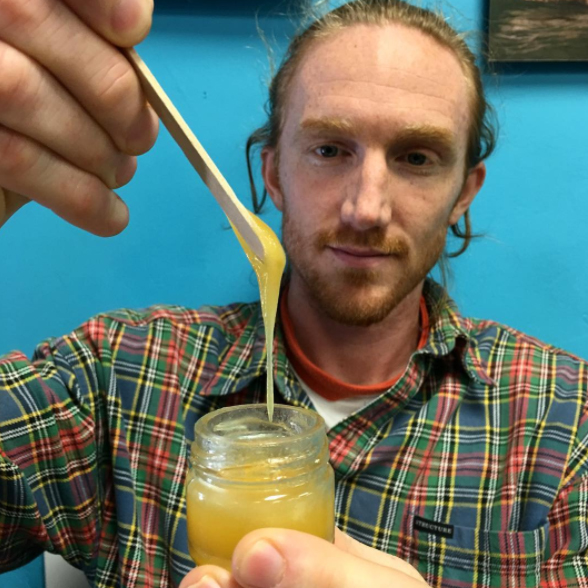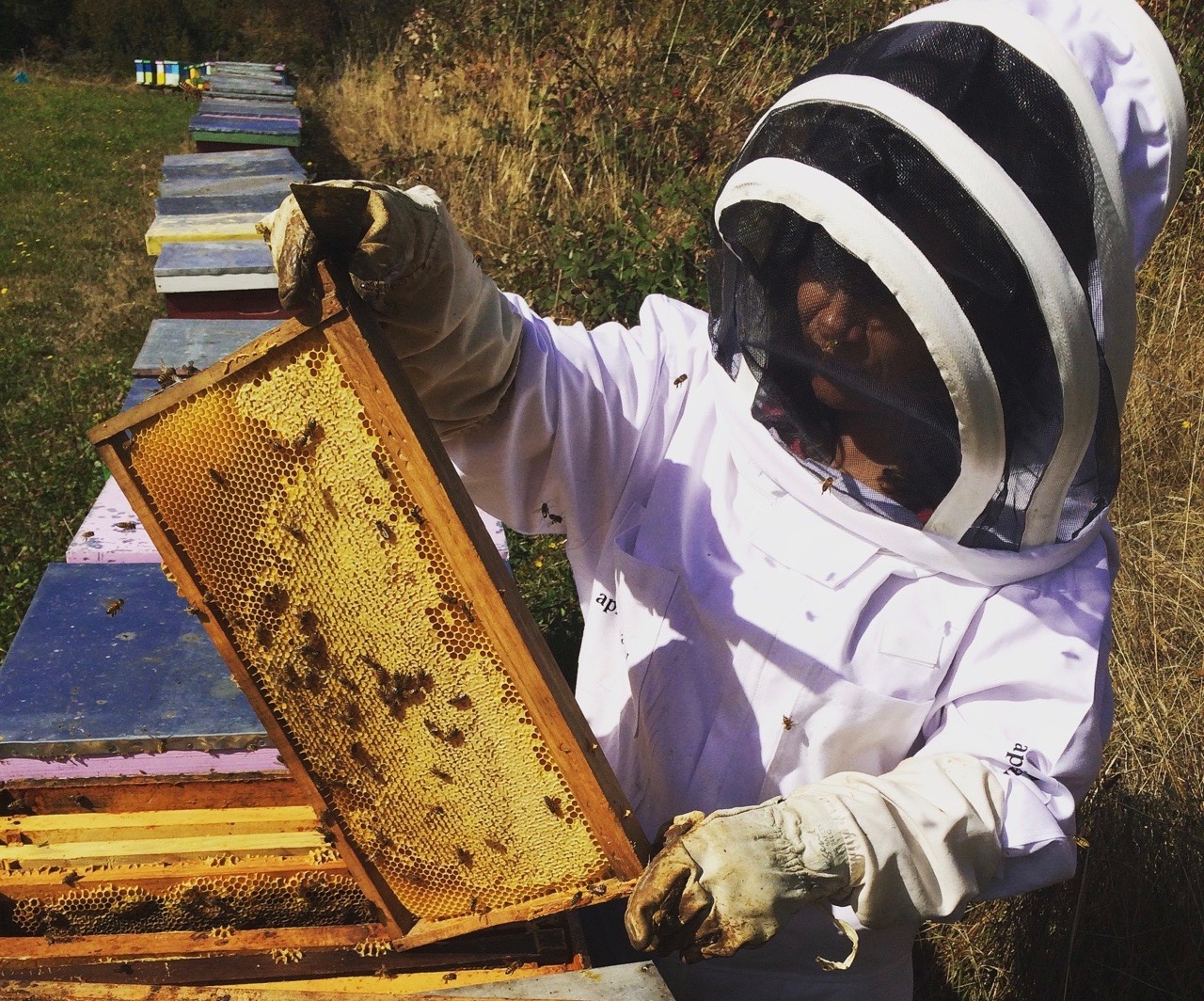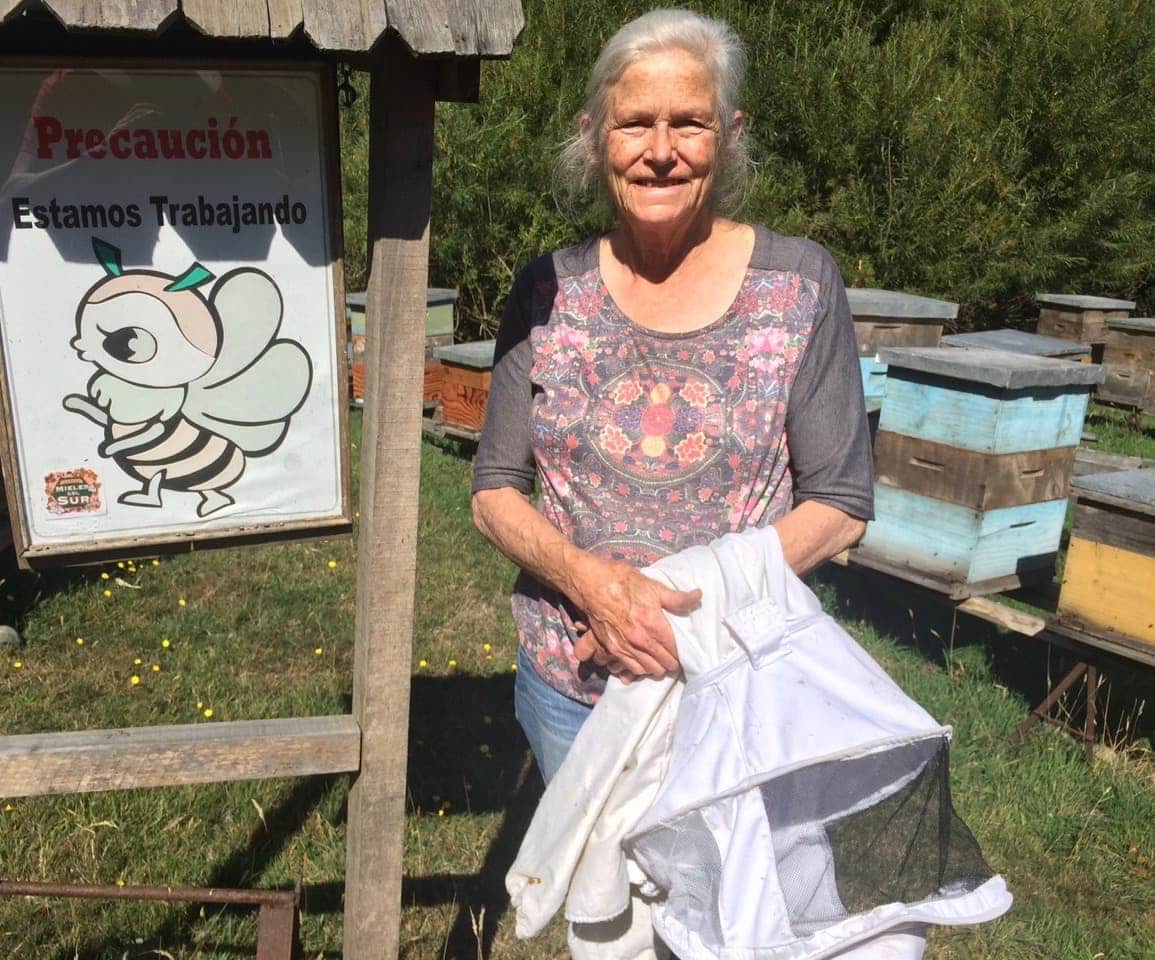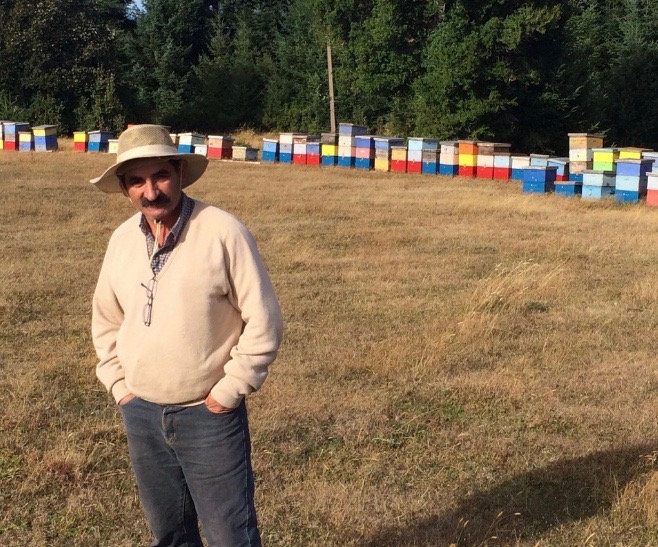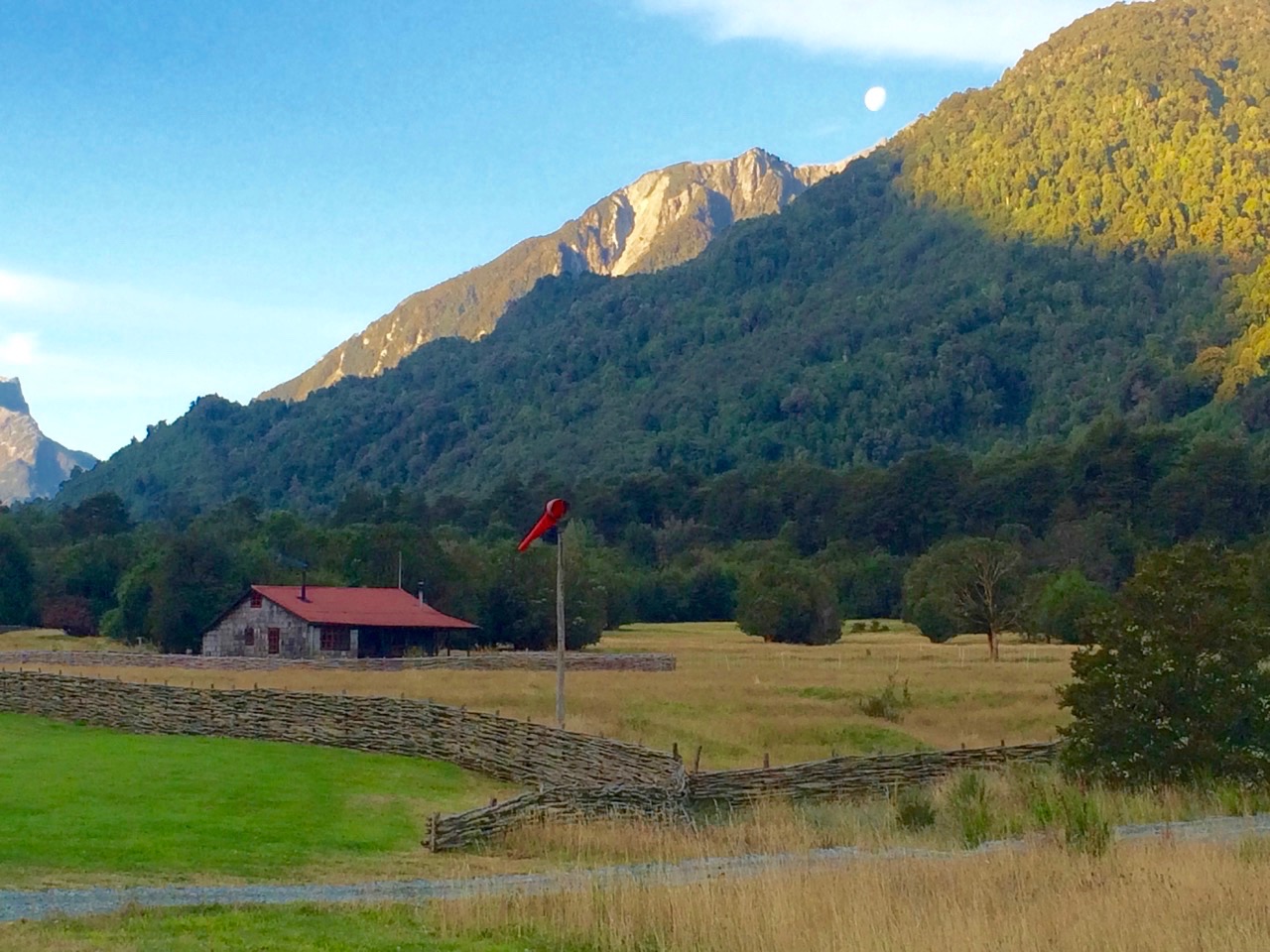Flavors of the Rainforest?
Ever imagined the lush rainforests of Patagonia as a taste? If making this sensory translation seems challenging, dip your spoon into Patagonia Bee Products’ honeys, and you’ll get it. Like wine, honey imbues flavors and aromas from the flowering trees visited by the bees who make it, imparting luscious floral properties into the honey. Since the hives that yield Ulmo, Tiaca, and Tineo honeys (named for the flowers pollinated by the bees producing them) border the pristine, native, largely untouched rainforests of Chile, a single taste instantly transports you. Because these flowers are endemic to the virgin rainforest, Patagonia is the only place in the world these honeys are found. All this is another way of saying that even if you commit your lifetime to doing so, you’ll be hard pressed to find honey more delicious and pure.
Jacob Perry of Patagonia Bee Products
When native Arkansan Jacob Perry went to South America for a backpacking trip in 2011, little did he know that he’d taste a honey whose flavor would captivate him so significantly that he wouldn’t be able to get it out of his mind for years to come. Not only would he launch Patagonia Bee Products to share geographically unique “hive to hand” honeys with the world, but in the process, Patagonia Bee Products would be the impetus for the revision of Chilean law to better support the livelihoods of small beekeepers and food producers, as well as providing economically sustainable support for rain forests. All-in-all, this graduate of Little Rock’s Clinton School of Public Service is pretty proud of what can happen when you insist on the highest standards in taste, beekeeping, and personal relationships.
“Hive to Hand”
When I talked with Jacob by phone in Fayetteville, he was anxiously awaiting his next shipment that evening—the first jars to bear new labels. His exuberance shone through in everything he shared. Fascinated by the new-to-me “hive to hand” description, I had to know more about what it means.
“I made it up to describe our honey! We’ve of course heard ‘farm to table,’ and ‘bean to bar.’ I wanted something quick that accurately described what I see as the role of Patagonia Bee Products—bringing honey from the hive of a beekeeper to the hand of the consumer without much involvement other than jarring and shipping it. Our honey is in the most unmolested, unadulterated form possible.”
For Patagonia Bee Products, what does hive to hand look like in practice?
“Every jar comes from a single beekeeper, preserving the uniqueness of a place and a harvest season. We source from a cooperative, composed of beekeepers committed to high standards. Each takes their honey, when ready, to a small plant registered with the Chilean government, where it is simply placed in a jar. It is not pasteurized, ultra-filtered, or homogenized. Also, nothing is added to it. Many America consumers don’t realize that most of Chile’s honey goes to Europe, which has higher quality standards than the US. The FDA doesn’t regulate honey, and the US accepts what Europe rejects. In the US, to be labeled honey, the product simply has to have pollen in it. Over 3/4 of the honey sold commercially in the US has gone through a process that involves filtering out much of the pollen and adding junk like corn syrup, rice syrup, other stuff that isn’t honey. They aren’t required to put anything on the label besides ‘honey,’ so consumers don’t even know what we’re getting!
Aside from that, so many of our global food sources depend on bees—they pollinate 1/3 of the world’s food supply. If you’ve heard about the devastation of hive collapse or Colony Collapse Disorder in the US, you may already understand why it is happening, but if not, basically it is because of poor and risky beekeeping standards . . . most commercial beekeepers in the US hire out their bees to pollinate crops and to chase big agricultural crop blooms. Moving bees from California, to Oregon, to Washington, etc. spreads disease among bees. Honeybees are also weakened and even killed by the harsh chemicals that are used on the crops.
In US, the rate of colony collapse is a staggering 50%. With our beekeepers, one or two hives may collapse out of a couple of hundred. Our beekeepers use only organic practices and personally attend to the health of their hives. They never chase pollination, and keep their hives in a single location.
Beekeeping is one of the few ways that makes it profitable to preserve rainforest. Since by preserving the rainforest, we are preserving Earth’s greatest example of biodiversity, this is something to seriously consider.”
Local Honey Helps Allergies: FALSE!
When Jacob revealed a truth I’ve never doubted as false, I’m floored. “It’s actually a total myth that local honey helps allergies. What is supposed to help allergies is having small doses of local allergens contained in local honey. Bees typically go to brightly colored flowers whereas humans are typically allergic to weeds and grasses. Bees aren’t pollinating weeds and grasses. It doesn’t bear out.” Oh. I see.
Also in health benefit news, Patagonia Bee Product’s Ulmo Honey was declared by an Irish university to have greater antibacterial properties than the previous holy grail of antibacterial and medicinal honeys, Manuka. From New Zealand, the same sized jar of Manuka costs $40–$50, or about 3 times as much as Ulmo, and has long been used as a medical remedy, especially for the healing of wounds. This Irish study revealed Ulmo as having greater antibacterial activity, including against MRSA and E. Coli. Plus, it tastes better.
Personal Connections Cultivate Fair Trading Practices
Jacob has said elsewhere that as part of his business practices, he considers it “vital to connect with people.” I was curious what personal connections mean to him, and in Chile, whether making them involves speaking Spanish. “I do! That’s part of working with Chilean beekeepers because they don’t speak any English. Patagonia Bee Products is my first excursion into the for-profit world. I’ve previously been with nonprofits. What I wanted to carry through was a model with people at the center. It has been essential to me to build personal relationships with beekeepers. When I go to Chile, I stay with them and their families in their houses. I harvest the honey alongside them. When I return to the US, I do samplings with customers and imagine that as completing the circle—sharing the stories of the honey that are important to all of us for so many reasons.
This also means paying beekeepers a dignified wage, which is higher than fair-trade-established prices for honey in Chile. Fair trade prices are set by the World Fair Trade Organization, which sets prices internationally based on many factors. Before Patagonia Bee Product’s first jar of honey was sold, I met with the beekeepers up front to decide if they wanted to officially have the Fair Trade designation. There were costs to them, and ultimately, they decided it wasn’t worth it, especially since they would be getting wages higher than those set by the WFTO. However, the principles we rely on are similar.”
What was it like to start a new, international business?
“Patagonia Bee Products was challenging from the start because although I knew I wanted to share this product with the world, I had no business experience and didn’t know where to start. I was so in the dark that I literally got online and Googled ‘beekeepers in Patagonia.’ I was overwhelmed trying to figure out labels and prices. In Fayetteville, there is a company called Startup Junkie, which offers free services to startups, and they helped me make a plan and got me out of my state of complete ignorance. From there, it just took a lot of tenacity. I called the US Embassy and made contacts there.
I set up visits. What took my breath away was the lack of competition and jealousy among the beekeepers. They have a camaraderie and supportive nature, reminiscent of bees working together! It’s really something to emulate, when we realize that we don’t have to undercut our competitors or diminish their work to thrive.
Once we decided to pull the trigger, took a long time to get approval from the Chilean government. They literally had to write legal procedures to help small businesses with the process of exporting, because previously they were forced to sell to huge exporters at reduced prices. So an unexpected, but fantastic, side affect is that this endeavor helped initiate laws that will connect Chilean small business owners more directly to the consumer, and even improve their lives.
Now, it feels so good that the business is self-sustaining and growing. As I try to bring this honey to more people, I just go to store owners and buyers and say, ‘Let me tell you this story.’ As they’re tasting, they realize they are used to all honey tasting the same and this tastes totally different. The honey is so good, and its story is authentic, so it sells itself. People fall in love with it quickly, just like I did, and most find that from then on, no other honey is good enough.”
I, for one, can attest that I’ve been caught creeping down the stairs in the dark for a spoonful of the Ulmo. Tasting what I taste and knowing what I know, I might be willing to sample another of Patagonia Bee Products’ honeys, but it’s hard to imagine myself straying from their hives.
